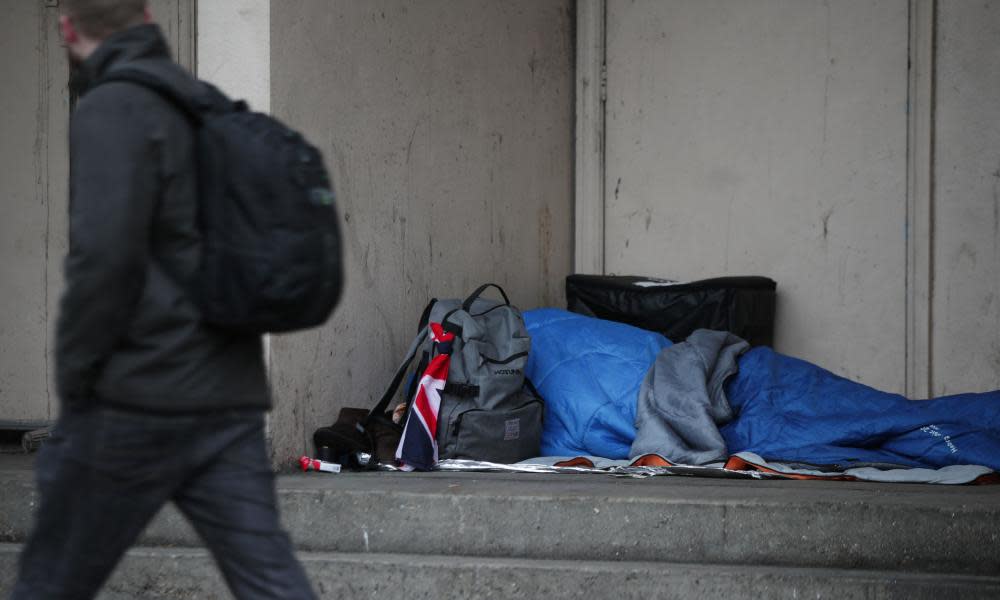Deaths of mentally ill rough sleepers in London rise sharply

Deaths of rough sleepers with mental health problems have risen sharply over the last seven years, prompting concern that specialist services are not reaching those who need them.
Research released on Tuesday by the homeless charity St Mungo’s shows that four out of five (80%) rough sleepers who died in London in 2017 had mental health needs, an increase from three in 10 (29%) in 2010.
The charity is calling on the prime minister to take urgent action to prevent more people dying on the streets and ensure that no death goes ignored.
“This is a scandal and something the government needs to recognise and do more about ... there should be more funds and support for these groups but instead they have been cut over the years and that correlates in these people stuck living on the streets ... these deaths are preventable,” said Petra Salva, director of St Mungo’s rough sleeping services.
Salva added: “The rise is because rough sleepers with mental health support needs end up sleeping rough and the help isn’t there and when it is there it is not quick enough ... access to help and support is getting harder and so the prevalence of death ... is increasing.”
The charity called on the government to invest more in specialist support, saying that with NHS services “severely overstretched” this could sometimes be overlooked.
“Research carried out by St Mungo’s showed that only 32% of the areas where 10 or more people are sleeping rough on any one night commission mental health services actively targeting people sleeping rough,” the report said.
Speaking anonymously, one street outreach worker quoted in the report, said: “There is no on-street mental health services like there used to be. There is limited beds [sic] spaces for people who need sectioning/need short inpatient care. There is an issue with dual diagnosis and neither service wanting to take responsibility,”
Additionally, 70% of outreach workers surveyed by the charity said access to mental health support for people sleeping rough had got harder over the last five years, compared to just 5% who said it had become easier and 25% who said it stayed the same.
The figures come amid concern about the growing number of homeless deaths and lack of reviews into what has led to them. Out of the hundreds of deaths that have occurred in recent years, reports suggest only eight have resulted in a review.
The Guardian and the Bureau of Investigative Journalists revealed earlier this year that 340 homeless people died on the streets or in temporary accommodation in the last six years, surging from 32 in 2013 to 78 in 2017. A further 59 deaths have been recorded so far this year, already more than the whole of 2016.
In the capital, the only place where a local authority actively records homeless deaths, 158 people died between 2010 and 2017, an average of one death a fortnight.
Experts have warned that without official counts and reviews it’s impossible to determine why so many homeless people are dying and take action to prevent future deaths.
The report also featured a survey of dozens of street outreach workers and 63% said they were aware of someone who had died while sleeping rough in their local authority area last year. However, only 23% had experienced a review being carried out.
The number of people sleeping rough has risen by 169% since 2010. Last year in England more than 4,700 people slept rough on any one night, and a far larger number experienced rough sleeping during the course of the year.
“With access to vital emergency accommodation and support services getting harder and harder, it is unsurprising that the number people dying on the streets is rising. Urgent action to provide rapid relief from rough sleeping is needed to turn this around,” the report stated.
Matt Downie, director of policy and external affairs at Crisis, said: “In 21st-century Britain, nobody should be dying on our streets, especially when there is clear evidence to show that rough sleeping – and all forms of homelessness – can be ended.
“Homelessness is a devastating experience. People sleeping on our streets – who are experiencing the most visible form of homelessness – are exposed to everything from sub-zero temperatures, to violence, to debilitating illnesses. And all of these dangers puts them at serious risk of death.”
Howard Sinclair, the St Mungo’s chief executive, said: “This is nothing short of a national scandal. These deaths are premature and entirely preventable.”
Sinclair said that he welcomed the government strategy set out by Sajid Javid to reduce the number of people sleeping rough.
“The forthcoming strategy presents a vital opportunity to make sure no one else dies as a result of sleeping rough. We are calling on the prime minister to follow through on her commitment to end rough sleeping by making sure all parts of the public sector play their part, especially the health, justice and welfare systems,” he said.

 Yahoo News
Yahoo News 
